Comparing Fables, Legends, and Myths
£3.00
Activities in this lesson include short summaries of the main features of fables, legends and myths, answering lower and higher order questions on these three genres and summarising the three genres.
There is a five-minute evidence-based CPD activity at the end of this lesson which will develop classroom teachers’ skill set. This CPD consists of a research extract on self-assessment with a five-minute activity based on this extract.
Description
These evidence-based learning (EBL) lessons are based on classroom practice that has been proven, by research, to maximise thinking, learning and attainment. From an extensive review of educational research, we identified the eight key classroom thinking and learning skills that were common across these research papers. We named these eight key skills “EBL skills”.
EBL skills have been proven by research to maximise learning because they combine the most productive thinking skills with the most effective learning behaviours. Each of our evidence-based learning lessons uses the English curriculum as a framework through which the eight EBL skills are delivered.
Teachers also have the opportunity to add to their own skill set or refresh their existing skills with our five-minute CPD activity, based on one of the EBL skills used in this lesson.
The skills in bold below are the EBL skills developed in this Fables lesson. Click on each skill to learn more about that skill.
- Collaboration
- Thinking Skills
- Peer Assessment
- Peer Teaching
- Self-Assessment
- Metacognition
- Self-Regulation
- Independent Learning
1 review for Comparing Fables, Legends, and Myths
Only logged in customers who have purchased this product may leave a review.
Related products
-

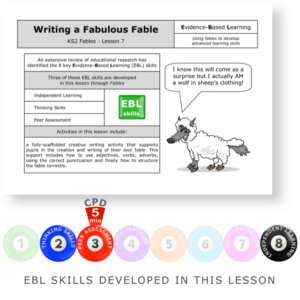
Writing a Fabulous Fable
£3.00 Add to basket £3.00Add to basket
£3.00Add to basketActivities in this lesson include a fully-scaffolded creative writing activity that supports pupils in the creation and writing of their own fable. This support includes how to use adjectives, verbs, adverbs, using the correct punctuation and finally how to structure the fable correctly.
There is a five-minute evidence-based CPD activity at the end of this lesson which will develop classroom teachers’ skill set. This CPD consists of a research extract on peer assessment with a five-minute activity based on this extract.
VIEW -
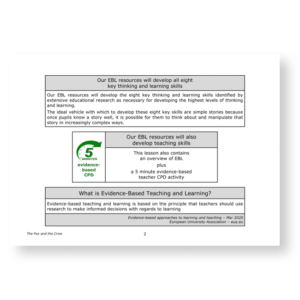
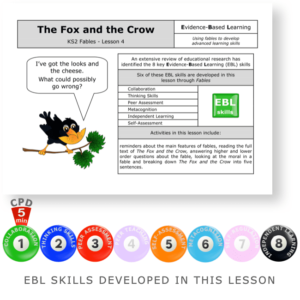
The Fox and the Crow
£3.00 Add to basket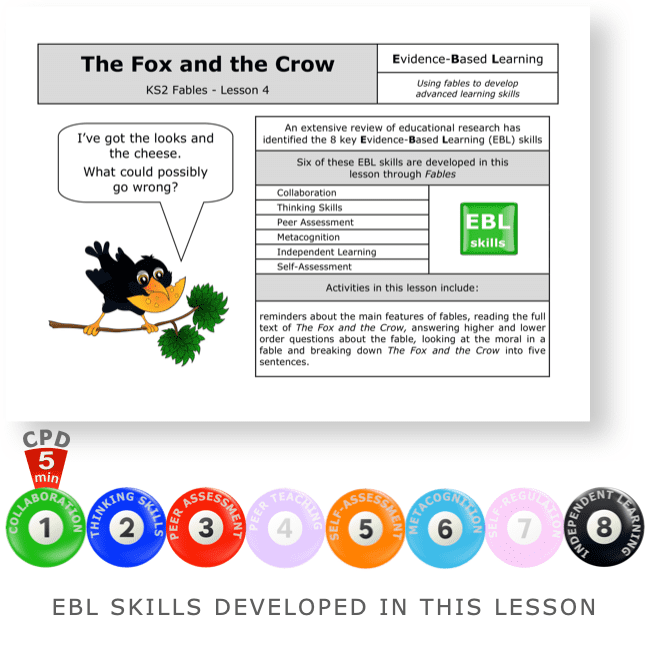 £3.00Add to basket
£3.00Add to basketActivities in this lesson include reminders about the main features of fables, reading the full text of The Fox and the Crow, answering higher and lower order questions about the fable, looking at the moral in a fable and breaking down The Fox and the Crow into five sentences.
There is a five-minute evidence-based CPD activity at the end of this lesson which will develop classroom teachers’ skill set. This CPD consists of a research extract on collaboration with a five-minute activity based on this extract.
VIEW -

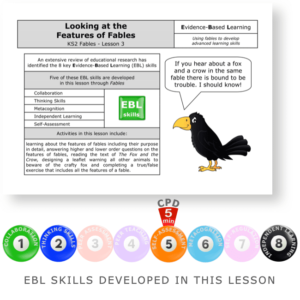
Looking at the Features of Fables
£3.00 Add to basket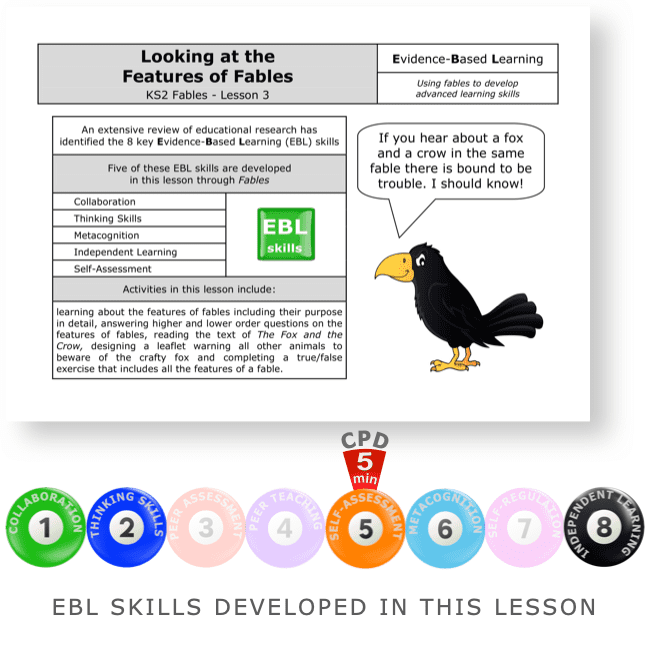 £3.00Add to basket
£3.00Add to basketActivities in this lesson include learning about the features of fables including their purpose in detail, answering higher and lower order questions on the features of fables, reading the text of The Fox and the Crow, designing a leaflet warning all other animals to beware of the crafty fox and completing a true/false exercise that includes all the features of a fable.
There is a five-minute evidence-based CPD activity at the end of this lesson which will develop classroom teachers’ skill set. This CPD consists of a research extract on self-assessment with a five-minute activity based on this extract.
VIEW -
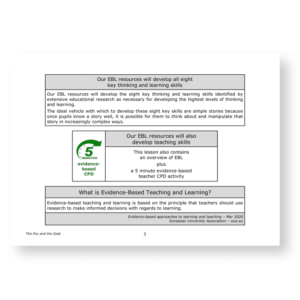

The Fox and the Goat
£3.00 Add to basket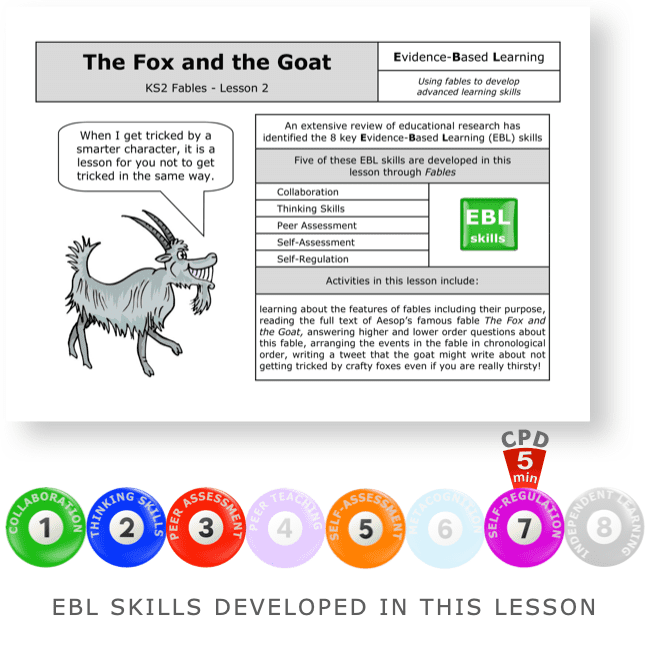 £3.00Add to basket
£3.00Add to basketActivities in this lesson include learning about the features of fables including their purpose, reading the full text of Aesop’s famous fable The Fox and the Goat, answering higher and lower order questions about this fable, arranging the events in the fable in chronological order, writing a tweet that the goat might write about not getting tricked by crafty foxes even if you are really thirsty!
There is a five-minute evidence-based CPD activity at the end of this lesson which will develop classroom teachers’ skill set. This CPD consists of a research extract on self-regulation with a five-minute activity based on this extract.
VIEW

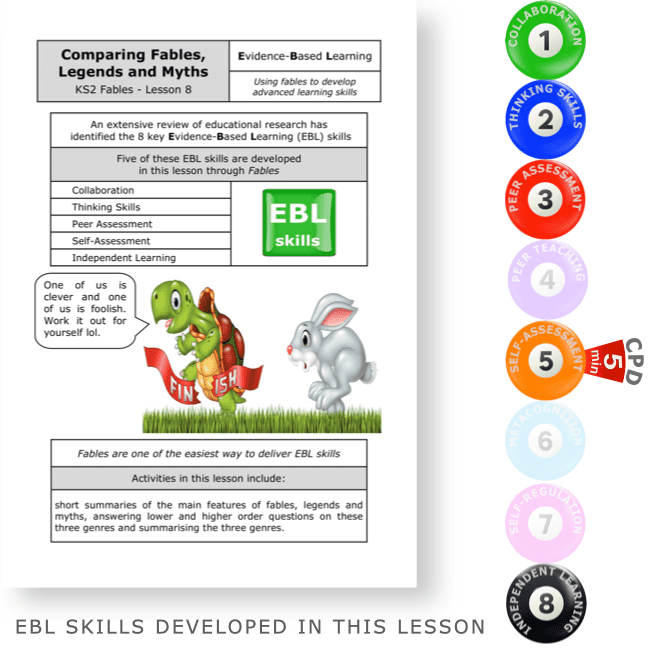
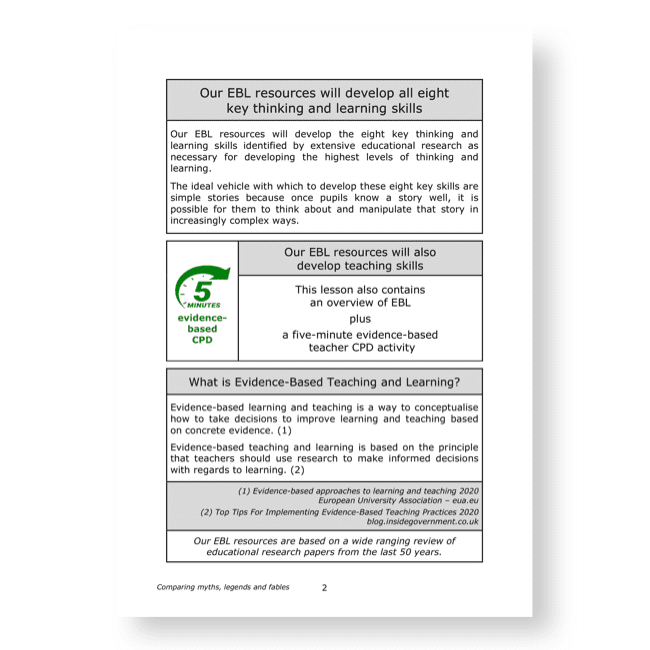
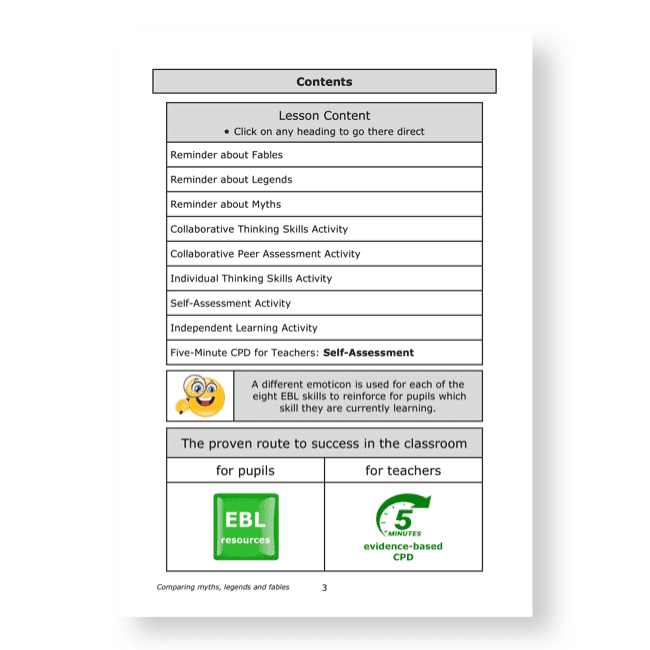
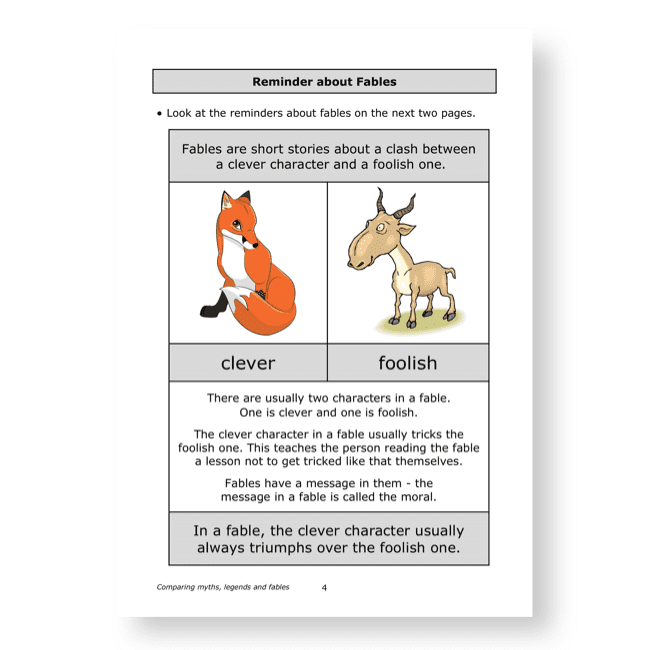
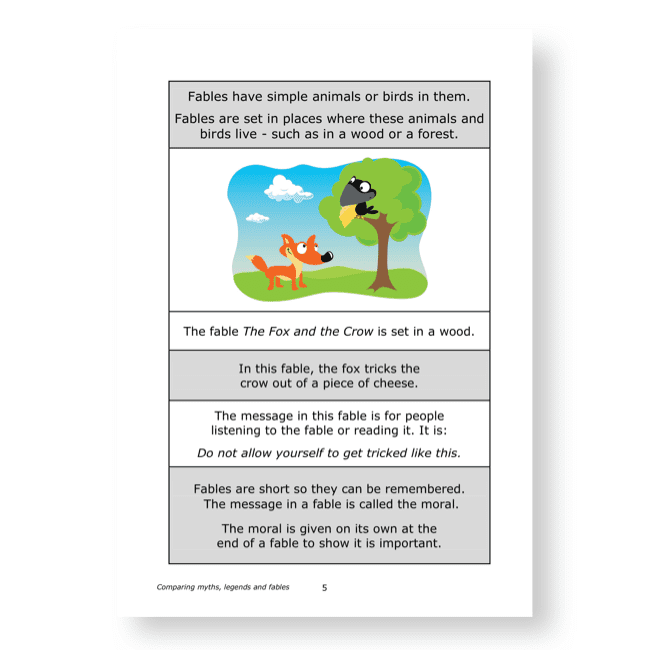
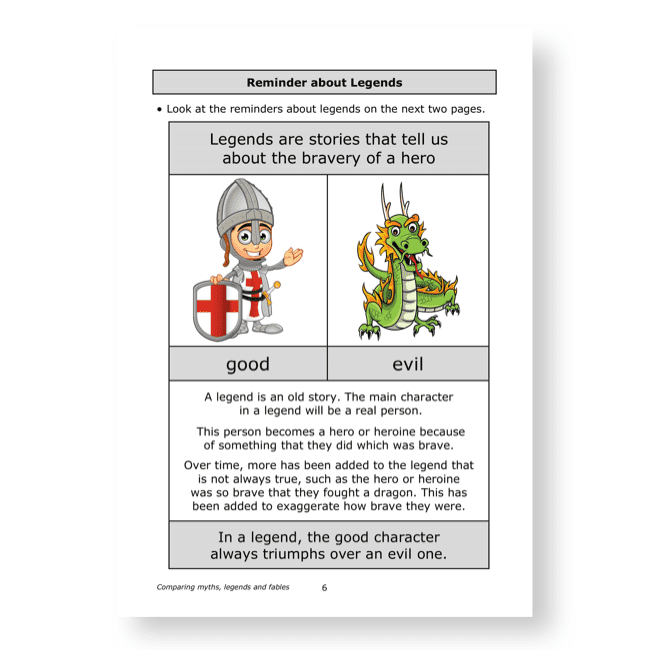
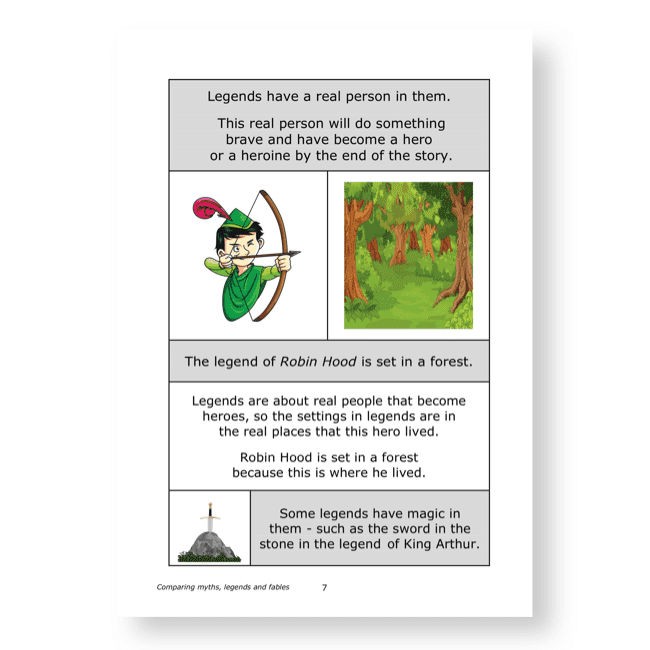

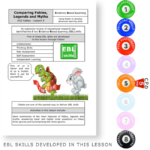
Philipem (verified owner) –
We asked Claude a.i. to review this lesson. This is what it said:
Teach English and Critical Thinking with “Comparing Fables, Legends, and Myths” ⭐⭐⭐⭐⭐
Want an engaging way to build your students’ English skills while also developing critical thinking abilities? Check out the lesson “Comparing Fables, Legends, and Myths.” This multifaceted resource not only reinforces understanding of these three key literary genres, but also intentionally targets five evidence-based learning skills.
The lesson starts by clearly summarising the main features of fables, legends, and myths on student-friendly pages. This content knowledge then provides the foundation for a series of collaborative and individual activities that activate higher order thinking. Students must analyse, evaluate, and create as they answer questions, compare answers with peers, assess their own explanations, and identify true and false statements.
The variety of individual, partner, and whole class learning experiences keeps students engaged while systematically building analysis, evaluation, and creation skills. Students are constantly reflecting on their own thinking and learning through built-in self-assessment opportunities.
Teachers also get a 5-minute CPD activity focused on the research behind self-assessment. Implementing regular self-assessment is shown to increase student ownership over learning. With its clear student materials, targeted skills development, and teacher guidance, this comprehensive lesson earns 5 stars. Add “Comparing Fables, Legends, and Myths” to your collection today!